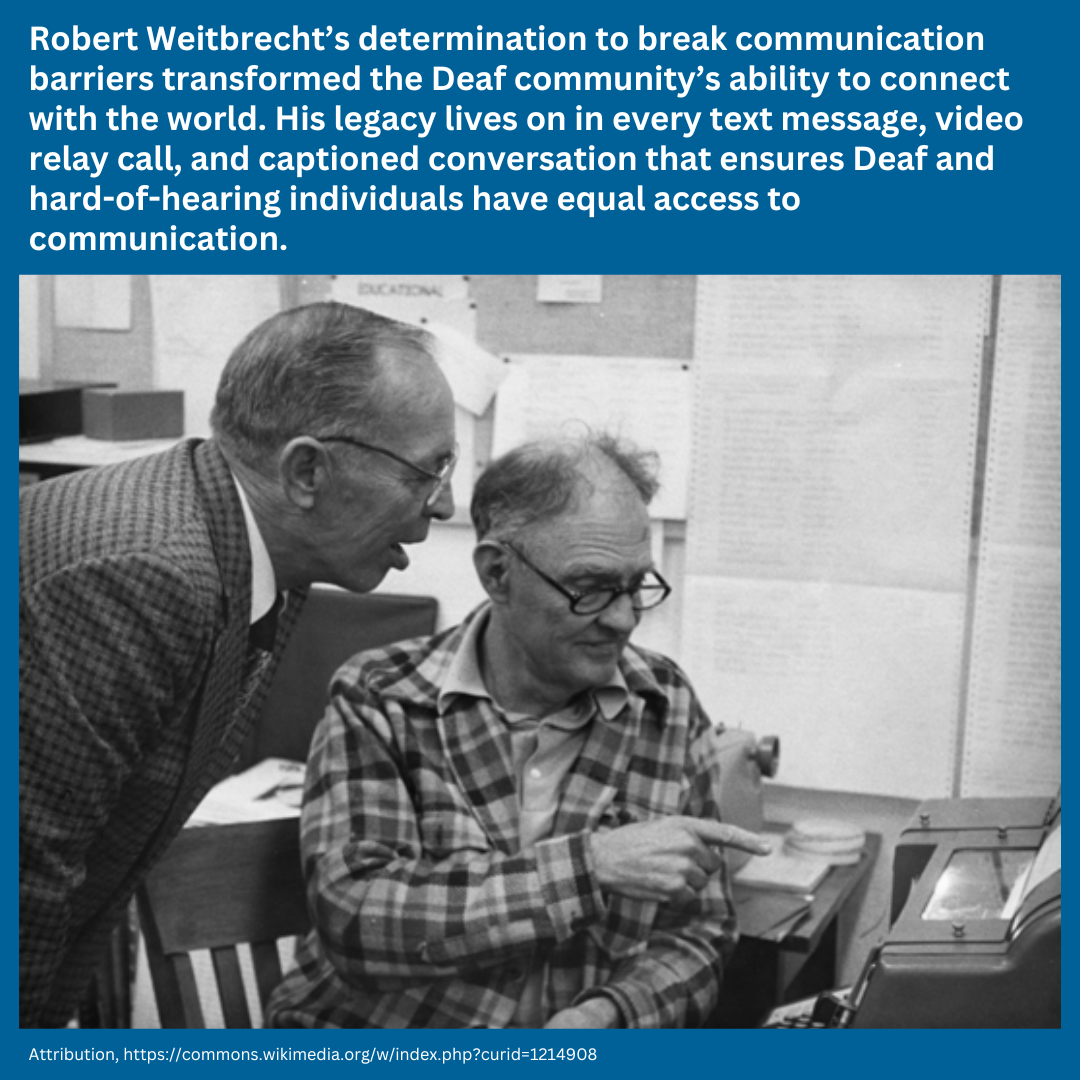Day 6. The Visionary Work of Robert Weitbrecht.

One Inventor Revolutionized Deaf Communication
“The biggest barrier to communication is not Deafness—it is the lack of access.” – Robert Weitbrecht
Before the digital age, Deaf and hard-of-hearing individuals faced severe communication barriers, especially when it came to making phone calls. That changed thanks to Robert Weitbrecht, a Deaf scientist and innovator who invented the teletypewriter (TTY), a groundbreaking device that enabled Deaf individuals to communicate over the phone for the first time.
Today, we honor Robert Weitbrecht’s visionary work and his commitment to accessibility, which paved the way for modern telecommunications, including text messaging, video relay services (VRS), and real-time captioning.
Who Was Robert Weitbrecht?
Born in 1920, Robert Weitbrecht was Deaf from birth, but he never let that limit his curiosity. A brilliant mind in science and technology, he earned degrees in astronomy, physics, and engineering.
Despite being discouraged from pursuing science because of his Deafness, Weitbrecht persisted and went on to work in radio communications, NASA projects, and signal processing. But one of the most personal challenges he wanted to solve was the lack of accessible telephone communication for the Deaf community.
The Invention That Changed Everything: The TTY
In the 1960s, Deaf people had no way to use the telephone. This created significant barriers to emergency services, job opportunities, and everyday communication.
Weitbrecht, determined to find a solution, developed the acoustic coupler, a device that allowed teletypewriters (originally used in newsrooms and government offices) to connect to telephones. This converted typed text into signals that could be transmitted over phone lines, allowing Deaf individuals to communicate via text over long distances.
📞 Before TTY: No direct way for Deaf people to make or receive calls.
💡 With TTY: Deaf individuals could now type messages and read responses, creating the first accessible phone system.
This invention was a game-changer for the Deaf community, and it led to the widespread adoption of TTY relay services, where hearing operators could relay typed messages between Deaf and hearing individuals.
The Lasting Impact of Weitbrecht’s Work
Robert Weitbrecht’s TTY laid the foundation for many modern accessible communication technologies, including:
- ✅ Relay Services – Enabled Deaf individuals to communicate with hearing people through intermediaries
- ✅ Text Messaging (SMS) – The concept of typing messages over a network is rooted in TTY technology
- ✅ Video Relay Services (VRS) – Advances in technology now allow for real-time ASL interpretation over video calls
- ✅ Live Captioning & Speech-to-Text Software – Innovations in accessibility that have benefited Deaf and hearing communities alike
Today, while TTY use has declined due to newer technologies, Weitbrecht’s work paved the way for Deaf-friendly digital communication and shaped policies that ensure equal access to telecommunication services under the Americans with Disabilities Act (ADA).
Memorable Quotes About Weitbrecht’s Impact
- 📜 “His work didn’t just make life easier for the Deaf—it made life fairer.”
- 📜 “Without the TTY, we wouldn’t have relay services, text messaging, or live captioning as we know them today.”
- 📜 “Technology should always be a tool for inclusion, and Robert Weitbrecht proved that with his work.”
Resources to Explore
- 📘 Book: “A Phone of Our Own: The Deaf Insurrection Against Ma Bell.” Explores the struggle for accessible telecommunication and Weitbrecht’s impact
- 📺 Video: “History of TTY and Deaf Communication.” A look at Weitbrecht’s legacy and how his invention changed lives
- 📜 National Association of the Deaf: “Telecommunications Accessibility.” Learn about current accessible communication laws and technology
Reflection
Robert Weitbrecht’s determination to break communication barriers transformed the Deaf community’s ability to connect with the world. His legacy lives on in every text message, video relay call, and captioned conversation that ensures Deaf and hard-of-hearing individuals have equal access to communication.
- 💬 How has accessible communication technology impacted your life?
- 💬 In what ways do you think the TTY impacted technology innovations that we all use?
Tomorrow, we’ll learn about an innovation for the hard of hearing that is seen as both life-changing and divisive.
Learn more: Read about how the Federal Communications Commission (FCC) supports and monitors the use of TTY communications systems.
#UU #UUA #CelebrateDiversity #DeafCulture #DeafHistoryMonth #DisabilityAwareness #RobertWeitbrecht #TTYRevolution #DeafCommunication
Discover more from SepulvedaUU
Subscribe to get the latest posts sent to your email.
